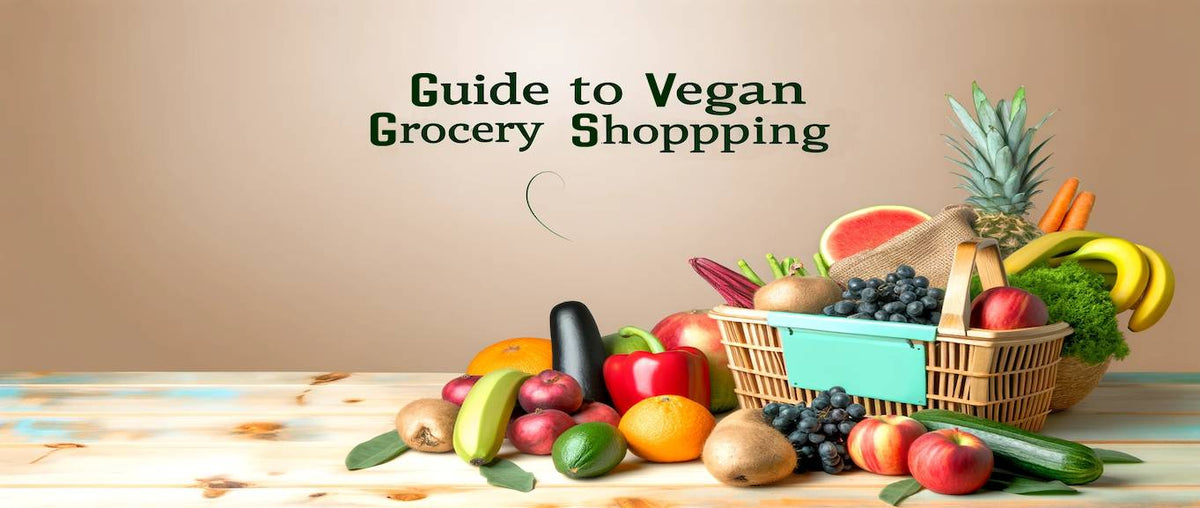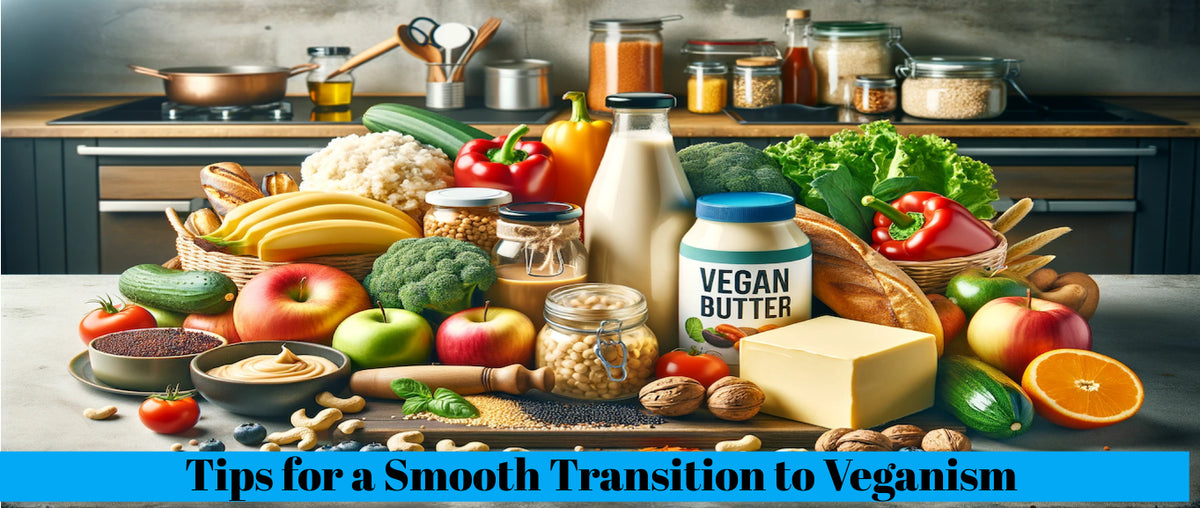Guide to Vegan Grocery Shopping
The journey to a healthier, more compassionate lifestyle begins at the grocery store. Embracing a Veganism means more than just excluding animal products; it's about nourishing your body with the right plant-based foods. This Guide to Vegan Grocery Shopping will help you navigate the aisles with confidence, ensuring you select the most nutritious and delicious vegan products available.
Key Takeaways
- Vegan shopping is more than just picking plant based foods; it's about understanding the nutrition and variety available.
- Building a vegan shopping list is key to maintaining a balanced diet.
- Budget-friendly tips can make vegan grocery shopping accessible and enjoyable.
Understanding Vegan Nutrition
Embarking on a vegan lifestyle requires an understanding of the nutritional needs that must be met through plant based foods. This section delves into the essential components of vegan nutrition, ensuring your diet is as balanced and nourishing as possible.
Carbohydrates in a Vegan Diet
Carbohydrates are a crucial energy source, especially in a vegan diet. Opting for whole, unprocessed carb sources provides sustained energy and essential nutrients. Here are some top choices:
- Oats: Perfect for breakfast, rich in fiber.
- Quinoa: A protein-packed grain, versatile for any meal.
- Sweet Potatoes: High in vitamins A and C, great for roasting or baking.
- Wholegrain Breads: Look for options without honey for a truly vegan choice.
Protein Sources for Vegans
Protein is fundamental for muscle repair and overall health. vegan food products offer ample sources of protein, such as:
- Lentils: Ideal for soups and stews.
- Chickpeas: Great for making homemade vegan mayo or hummus.
- Black Beans: Excellent in tacos or burritos.
- Tofu: A versatile protein source, absorbing flavors from marinades and spices.

Essential Fats in Vegan Foods
Fats are vital for nutrient absorption and brain health. Opt for healthy, unsaturated fats found in:
- Avocado: Delicious in salads or on toast.
- Nuts and Cashew Butter: Great for snacking or adding to smoothies.
- Plant based oils, like olive or coconut oil, are perfect for cooking.
Vitamins and Minerals for Vegans
Certain vitamins and minerals can be challenging to obtain in a vegan diet. Focus on:
- Vitamin B12: Found in fortified foods or supplements.
- Iron: Abundant in leafy greens and legumes.
- Calcium: Look for fortified plant-based milks and tofu.
Importance of Fiber in a Vegan Diet
Fiber is key for digestive health. plant based foods like fruits, vegetables, and whole grains are excellent fiber sources.
What Do Vegans Not Eat?
Understanding what to avoid is as important as knowing what to include in a vegan diet. Vegans typically avoid:
- Meat and Poultry: This includes beef, chicken, pork, and all other forms of animal flesh.
- Dairy Products: Such as milk, cheese (including vegan cheese and plant-based cheese), and yogurt.
- Eggs: Found in many baked goods and some pasta.
- Honey: Opt for plant-based sweeteners like agave or maple syrup.
- Gelatin: Common in gummy candies and some desserts.
- Certain E-numbers: Some colorings and additives are derived from animals.
How To Build A Vegan Shopping List
Creating a shopping list is vital for a stress-free experience and ensures you don't miss essential items. Include:
- Fresh Produce: Fruits and vegetables for nutrients and fiber.
- Protein Sources: Beans, legumes, tofu, and tempeh.
- Dairy Alternatives: Plant-based milks, vegan butter, and vegan cheese.
- Whole Grains: Quinoa, brown rice, whole wheat pasta.
- Snacks: Nuts, seeds, and plant-based products like vegan mayo or Cashew butter.
- Herbs and Spices: To add flavor without extra calories.
Shopping For Nutrients
When shopping, think about the nutrients each food provides:
- Protein: Essential for muscle and cell repair, found in legumes, tofu, and nuts.
- Iron: Crucial for blood health, abundant in leafy greens and lentils.
- Calcium: Needed for bone health, available in fortified plant milks and tofu.
- B12: Important for nerve health, often supplemented or found in fortified foods.
Which Grocery Stores Carry Vegan Products?
Most supermarkets now have a range of vegan products. Look for dedicated vegan sections or check labels in standard aisles. Health food stores and online Vegan Shop also offer a wide array of vegan food products.
Vegan Grocery Shopping on a Budget
Vegan eating doesn't have to be expensive. Tips for budget-friendly shopping include:
- Buy in Bulk: Items like grains, nuts, and legumes are cheaper in larger quantities.
- Choose Seasonal Produce: Fresher, tastier, and often less expensive.
- Opt for Store Brands: Many store-brand items are accidentally vegan and cost less.
- Prepare Meals at Home: Cooking from scratch is usually cheaper than pre-packaged meals.
Detailed Food Categories
When it comes to vegan grocery shopping, knowing the variety and benefits of different food categories is crucial. This ensures a well-rounded and nutritious diet.
Fruits
Fruits are nature's desserts, packed with vitamins, minerals, and fiber. Include a range of colors and types in your diet:
- Berries: Rich in antioxidants.
- Citrus Fruits: High in vitamin C.
- Bananas: Great for energy and potassium.
- Apples and Pears: Fiber-rich and versatile.
Vegetables
Vegetables are the cornerstone of a healthy vegan diet. They provide essential nutrients with minimal calories.
- Leafy Greens: Like spinach and kale, for iron and calcium.
- Cruciferous Vegetables: Broccoli, cauliflower, and Brussels sprouts, high in vitamins and cancer-fighting compounds.
- Root Vegetables: Carrots, beets, and sweet potatoes, for fiber and beta-carotene.

Legumes
Legumes are a protein-packed staple in any vegan diet.
- Lentils: Quick to cook and rich in protein and iron.
- Chickpeas: Versatile for salads, stews, or making vegan mayo.
- Beans: Black, pinto, kidney – great for heart health and protein.
Nuts and Seeds
Nuts and seeds are nutrient-dense snacks that provide healthy fats, protein, and fiber.
- Almonds, Cashews, and Walnuts: For snacking or making Cashew butter.
- Flaxseeds and Chia Seeds: Rich in omega-3 fatty acids, perfect for adding to smoothies or yogurt.
Dairy Alternatives
The variety of dairy-free alternatives has grown tremendously, offering delicious substitutes for traditional dairy products.
- Plant-based milks: Almond, soy, oat, and coconut milk.
- Vegan cheese and vegan butter: Great for cooking and baking.
- Plant-based yogurts: Made from soy, almond, or coconut.
Also Read
Whole Grains
Whole grains are a great source of fiber and vital nutrients.
- Quinoa: A complete protein and gluten-free.
- Brown Rice: Versatile and filling.
- Whole Wheat Pasta: For a fiber-rich alternative to regular pasta.
- Oats: Perfect for a heart-healthy breakfast.
Shopping Tips for Vegans
Navigating the grocery store as a vegan can be simple with these tips:
- Read Labels: Look for hidden animal products.
- Shop the Perimeter: This is where you'll find fresh produce and bulk items.
- Explore Ethnic Foods: Often a great source of affordable and diverse vegan products.
Vegan Meal Planning and Preparation
Planning is key to maintaining a varied and exciting vegan diet.
- Batch Cooking: Prepare meals in advance for the week.
- Experiment with Recipes: Use a variety of spices and flavors to keep meals interesting.
- Include a Rainbow: Different colored foods ensure a range of nutrients.
The Benefits of Vegan Grocery Shopping
Embracing vegan grocery shopping offers numerous benefits beyond personal health. It's a choice that positively impacts the environment and animal welfare. Let's delve into some of these advantages:
Health Benefits
- Reduced Risk of Chronic Diseases: Plant-based diets are linked to lower risks of heart disease, diabetes, and certain types of cancer.
- Improved Digestive Health: High fiber content in fruits, vegetables, and whole grains promotes a healthy digestive system.
- Weight Management: A balanced vegan diet can lead to a healthier body weight and improved weight management.
Environmental Impact
- Reduced Carbon Footprint: Plant-based diets are generally associated with lower greenhouse gas emissions compared to meat-based diets.
- Conservation of Water: Vegan foods, particularly grains and legumes, require significantly less water to produce than animal products.
- Preservation of Ecosystems: Choosing plant-based foods can contribute to reduced deforestation and habitat loss.
Ethical Considerations
- Animal Welfare: Avoiding animal products directly contributes to the reduction in demand for factory farming and the mistreatment of animals.
- Supporting Sustainable Practices: Purchasing vegan products often supports companies and farmers who are committed to ethical and sustainable practices.

Incorporating Vegan Substitutes in Daily Cooking
One of the joys of vegan cooking is discovering the variety of substitutes that can mimic or even enhance the flavors and textures of traditional animal-based ingredients. Here are some popular substitutes:
For Meat
- Tofu and Tempeh: Versatile and can absorb flavors well; great for stir-fries and grilling.
- Seitan: Also known as wheat meat, it has a chewy, meat-like texture.
- Vegan meat alternatives: Various products mimic the taste and texture of meat, from burgers to sausages.
For Dairy
- Nut-based Cheeses: Such as Vegan Cheese made from cashews.
- Plant Milks: Like almond, oat, and soy, used in cereals, coffee, and cooking.
- vegan butter : Ideal for baking and cooking, with a similar taste and texture to dairy butter.
For Eggs
- Flax or Chia Seeds: Mixed with water, they can be used as a binding agent in baking.
- Silken Tofu: Blends smoothly for creamy textures in desserts and dressings.
- Commercial Egg Replacers: Available in most health food stores, perfect for baking.
Creative Vegan Recipes
- Cashew Alfredo Sauce: A creamy, dairy free alternative to traditional Alfredo sauce.
- Chickpea Tuna Salad: A fish-free version of the classic tuna salad, using mashed chickpeas.
- Vegan Chocolate Cake: Using plant-based ingredients to create a rich, moist cake.
Conclusion
The journey through vegan grocery shopping is an exciting exploration of flavors, textures, and nutrients. With this comprehensive guide, you're well-equipped to make choices that align with your health goals, ethical beliefs, and environmental concerns. Embrace the adventure of discovering new foods and creating delicious vegan meals that nourish both the body and soul.
Craving a delicious vegan meal? Look no further! We've got a guide to the best vegan restaurants in India, ready to help you discover amazing plant-based eats in your city.










